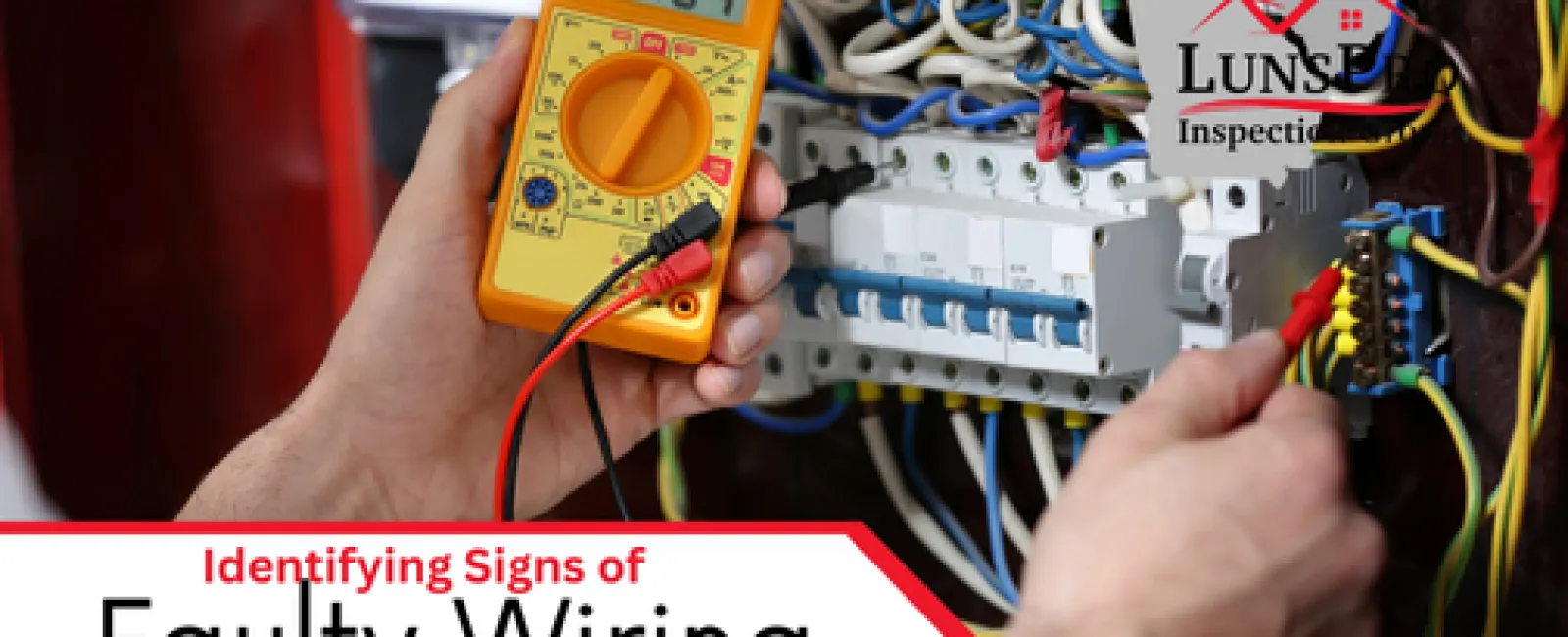Owning an older home in Atlanta can be a rewarding experience, with many properties boasting historical charm, unique features, and a sense of character that is hard to replicate. However, older homes often come with their own set of challenges, particularly when it comes to electrical systems. Faulty or outdated wiring can pose serious safety risks, including fire hazards, electrical shocks, and costly repairs. Identifying signs of faulty wiring early can prevent dangerous situations and help ensure your home remains safe and functional.
For homeowners in Atlanta, where many homes are several decades old, understanding the warning signs of electrical issues is critical. This article will provide essential tips on how to identify faulty wiring in older homes, along with practical steps for addressing these problems. LunsPro Inspection Group offers expert Atlanta residential and commercial home inspections, ensuring that your property is thoroughly assessed for potential electrical hazards.
1. Outdated Wiring Systems in Older Atlanta Homes
One of the most common issues in older homes is the presence of outdated wiring systems. These systems, such as knob-and-tube wiring, aluminum wiring, and non-grounded outlets, can present serious risks if not addressed. Each type of outdated wiring has its own unique set of hazards, and understanding these risks is the first step in protecting your home.
Knob-and-Tube Wiring: Found in homes built before the 1950s, knob-and-tube wiring is considered outdated and dangerous due to its lack of grounding and insulation. This type of wiring can overheat, increasing the risk of electrical fires. If you suspect your home has knob-and-tube wiring, it's essential to have a professional inspect the system and recommend updates.
Aluminum Wiring: Common in homes built between the 1960s and 1970s, aluminum wiring is more prone to loosening and overheating than modern copper wiring. Homes with aluminum wiring may experience frequent circuit breaker trips, warm outlets, or flickering lights. Atlanta wiring inspections by LunsPro Inspection Group can help identify these issues and recommend safe alternatives, such as replacing the aluminum wiring with copper.
Non-Grounded Outlets: Non-grounded outlets, which have only two prongs, are common in older homes. These outlets lack a grounding wire, making them more susceptible to electrical surges and shocks. Upgrading to three-prong, grounded outlets is crucial for preventing electrical hazards and ensuring that modern appliances function safely.
2. Frequent Circuit Breaker Trips or Blown Fuses
In older Atlanta homes, frequent circuit breaker trips or blown fuses can be a sign of an overloaded or faulty electrical system. Modern appliances, electronics, and lighting fixtures demand more power than the electrical systems in older homes were designed to handle. As a result, circuits can become overloaded, causing breakers to trip or fuses to blow.
If your circuit breakers are tripping frequently, it may be a sign that the electrical panel is outdated or that the wiring is insufficient for your home's needs. In some cases, the solution may involve adding additional circuits or upgrading the electrical panel. LunsPro Inspection Group offers thorough Atlanta residential and commercial home inspections to assess whether your electrical system can handle your current power demands.
3. Flickering or Dimming Lights
Flickering or dimming lights can indicate a variety of wiring problems, including loose connections, faulty wiring, or overloaded circuits. While flickering lights are sometimes caused by a simple issue like a loose light bulb, persistent flickering may signal a more serious problem with the electrical system.
In older homes, flickering lights are often a result of deteriorating wiring connections. Homes with aluminum wiring, in particular, may experience frequent flickering due to the expansion and contraction of the metal, which causes connections to loosen over time. If you notice your lights flickering, especially when using high-energy appliances, it's a good idea to have a professional perform an Atlanta wiring inspection to determine the root cause and recommend necessary repairs.
4. Warm or Discolored Outlets and Switches
Warm outlets, switches, or electrical panels are a major red flag when it comes to electrical safety. Overheating outlets or switches can be a sign that the wiring is faulty or that there is too much electrical demand on a circuit. Additionally, if you notice scorch marks or discoloration around outlets, it may indicate that the wiring is arcing, which is a serious fire hazard.
Older homes in Atlanta may have outdated wiring that is not capable of safely handling modern electrical loads. If you notice warm or discolored outlets, it's important to address the issue immediately to prevent potential electrical fires. LunsPro Inspection Group can perform a thorough electrical inspection to identify the source of the problem and recommend updates to improve safety.
5. Strange Odors or Buzzing Sounds
Electrical systems should operate silently and without any unusual odors. If you notice a burning smell or hear buzzing or crackling sounds coming from outlets, switches, or the breaker panel, it's time to take action. These warning signs often indicate that the wiring is overheating, or that there is a loose connection causing electricity to arc.
Electrical arcing is a serious hazard that can lead to fires. In homes with outdated or faulty wiring, such as those with knob-and-tube systems or aluminum wiring, these issues are more common. If you notice any strange odors or sounds coming from your electrical system, it's essential to turn off the power to the affected area and contact a professional for an Atlanta wiring inspection.
6. Sparking from Outlets or Switches
Sparks are never a good sign when it comes to electrical systems. If you see sparks when plugging in appliances or turning on a switch, this could be a sign of faulty wiring, loose connections, or an overloaded circuit. Sparking can quickly lead to electrical fires if not addressed.
Older homes, particularly those built before modern electrical safety standards, are more likely to experience sparking issues. LunsPro Inspection Group recommends that homeowners in Atlanta schedule an inspection to evaluate the safety of their electrical systems, especially if sparks have been observed.
7. Insufficient Electrical Capacity
Many older homes in Atlanta were built with electrical systems that are now insufficient for modern energy demands. Over the decades, the number of appliances, electronic devices, and lighting systems in homes has increased significantly. Older electrical systems, often featuring fewer circuits and lower amperage, may struggle to support the power needs of today's households.
Signs that your home has insufficient electrical capacity include frequent circuit breaker trips, flickering lights, and dimming when multiple appliances are in use. LunsPro Inspection Group offers comprehensive Atlanta home maintenance services, including upgrades to electrical panels and wiring systems, ensuring that older homes can handle today's power demands safely.
8. Specialized Inspections Using Drone Technology
In addition to traditional electrical inspections, LunsPro Inspection Group also provides Atlanta drone inspections to assess home exteriors and rooftops for electrical hazards. Drones allow inspectors to safely and efficiently evaluate hard-to-reach areas where wiring issues may be present. This technology is especially beneficial for large properties or commercial buildings where a thorough electrical inspection is needed.
Owning an older home in Atlanta comes with unique benefits, but it also requires extra attention to maintenance—especially when it comes to the electrical system. Outdated wiring, frequent breaker trips, flickering lights, and other signs of faulty wiring should never be ignored. Addressing these issues promptly can help prevent serious home hazards, including electrical fires and shocks.
For homeowners in Atlanta, LunsPro Inspection Group offers comprehensive Atlanta residential and commercial home inspections that include detailed electrical evaluations. Whether your home has knob-and-tube wiring, aluminum wiring, or insufficient electrical capacity, we can help you identify potential problems and provide solutions to keep your home safe and up to code.

